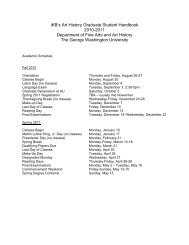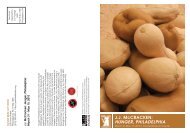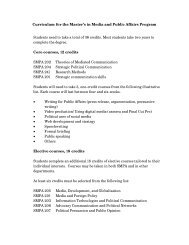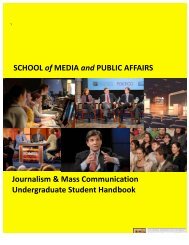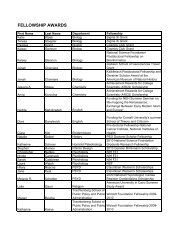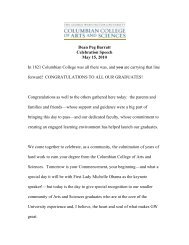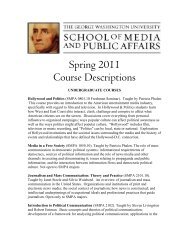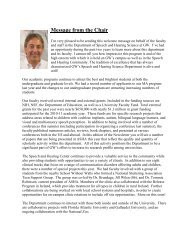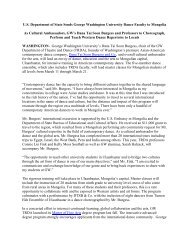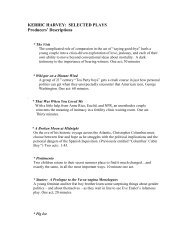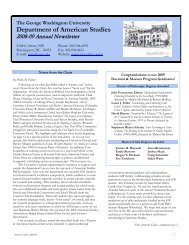Media Coverage and a Federal Grand Jury
Media Coverage and a Federal Grand Jury
Media Coverage and a Federal Grand Jury
You also want an ePaper? Increase the reach of your titles
YUMPU automatically turns print PDFs into web optimized ePapers that Google loves.
decline as the nation’s leading muckraker while a new generation of<br />
younger investigative reporters took over the field. 84<br />
Still, Anderson’s flagrant defiance of gr<strong>and</strong> jury secrecy was a<br />
symbol of just how much the relationship between the press <strong>and</strong> the<br />
Nixon administration had changed as a result of Watergate. Just a<br />
year after the media’s major setback in the Supreme Court’s Branzburg<br />
v. Hayes decision, which forced reporters under certain circumstances<br />
to reveal confidential sources to the government, Anderson’s<br />
unapologetic publication of secret gr<strong>and</strong> jury transcripts in some<br />
ways reversed the power dynamic. While Branzburg affirmed the<br />
government’s ability to use the gr<strong>and</strong> jury system to investigate reporters’<br />
sources, Anderson managed to use the gr<strong>and</strong> jury system to<br />
investigate the government itself. Where once journalists had been<br />
hunted by the Nixon administration, now they were the hunters; <strong>and</strong><br />
it was the White House, not the media, that had become the prey.<br />
Although the Watergate leaks to Jack Anderson <strong>and</strong> other reporters<br />
underst<strong>and</strong>ably disturbed judges charged with protecting<br />
gr<strong>and</strong> jury secrecy, they also provided a vital independent journalistic<br />
check on gr<strong>and</strong> jury abuses. In so doing, they did not resolve<br />
the old conflict between the First <strong>and</strong> Sixth Amendments. Just the<br />
opposite: in the aftermath of Watergate, media coverage of secret<br />
gr<strong>and</strong> jury proceedings would become increasingly common—leading<br />
to ongoing conflicts between the press <strong>and</strong> the courts over gr<strong>and</strong><br />
jury secrecy that continue to the present day. 85<br />
Endnotes<br />
1 Michael Schudson, Watergate in American Memory: How We Remember,<br />
Forget, <strong>and</strong> Reconstruct the Past (New York: Basic Books, 1993), 104.<br />
2 Stanley I. Kutler, The Wars of Watergate: The Last Crisis of Richard Nixon<br />
(New York: W.W. Norton <strong>and</strong> Co., 1990), 226, 255, 271, 615, vii-vii; Gladys<br />
Engel Lang <strong>and</strong> Kurt Lang, The Battle for Public Opinion: The President,<br />
the Press, <strong>and</strong> the Polls During Watergate (New York: Columbia University<br />
Press, 1983), 302-04; Edward Jay Epstein, Between Fact <strong>and</strong> Fiction: The<br />
Problem of Journalism (New York: Vintage Books, 1975), 21-32; <strong>and</strong> Mark<br />
Feldstein, “Watergate Revisited,” American Journalism Review, v. 26, no.<br />
4 (Aug./Sept. 2004), 60-67.<br />
3 Literature about columnist Jack Anderson’s publication of Watergate<br />
gr<strong>and</strong> jury transcripts has been spotty, mentioned only briefly in news accounts<br />
of the time <strong>and</strong> a h<strong>and</strong>ful of subsequent books: Jack Anderson <strong>and</strong><br />
Daryl Gibson, Peace, War, <strong>and</strong> Politics: An Eyewitness Account (New York:<br />
Forge, 1999), 257-62; Brit Hume, Inside Story (Garden City, New York:<br />
Doubleday, 1974), 284-96; James H. Dygert, The Investigative Journalist:<br />
Folk Heroes of a New Era (Englewood Cliffs, New Jersey: Prentice-Hall,<br />
22 • American Journalism —



